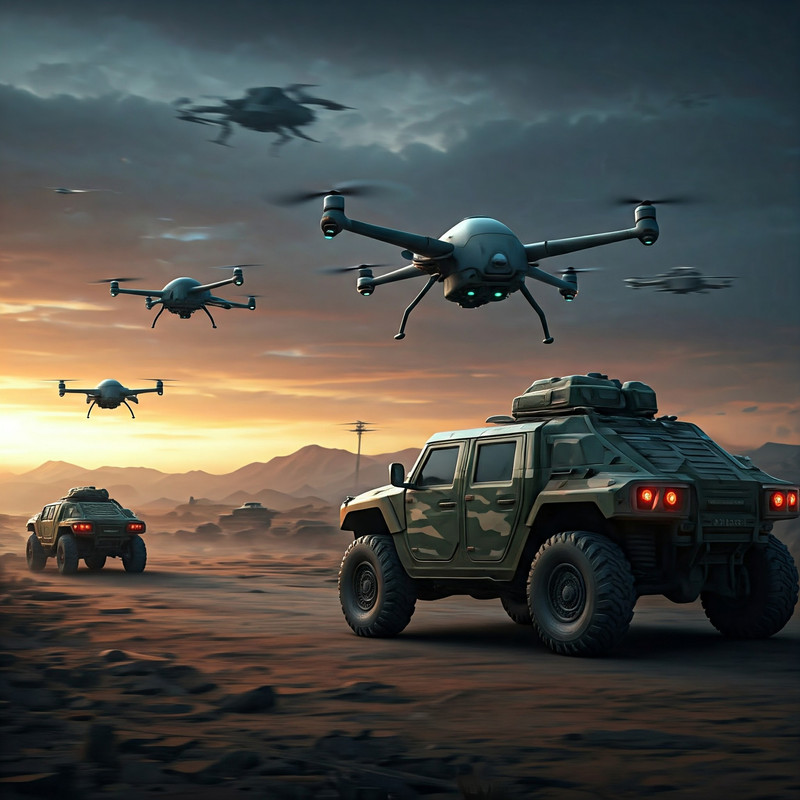SOURCE: AFI

Artificial Intelligence (AI) is rapidly transforming the landscape of military operations, providing tools that can significantly enhance the capabilities of the Indian Army in combat zones. From improving situational awareness to streamlining logistics, AI offers a plethora of applications that could redefine how the Indian military engages in modern warfare.
AI systems can process vast amounts of data from various sources like drones, satellites, and ground sensors to provide real-time insights. This capability can help in identifying enemy movements, predicting their strategies, and offering tactical advantages by reducing the sensor-to-shooter loop.
AI-driven unmanned vehicles, including drones and robotic sentries, can monitor vast and inhospitable terrains without the risk to human life. These systems can detect, track, and classify targets autonomously, enhancing border security and counter-terrorism operations.
mproving Intelligence, Surveillance, and Reconnaissance (ISR)
- Pattern Recognition: AI algorithms can analyze patterns in enemy communications or movements, providing predictive intelligence that can be critical for preemptive action. Systems like the AI-Powered Military Objects Detection for satellite imagery exemplify how AI can enhance ISR capabilities.
- Target Acquisition and Engagement: With innovations like the AI-based Scope for Target Acquisition and Engagement (ASTRAE), AI can assist in accurately identifying and engaging targets, even in dynamic and complex environments, thereby increasing the effectiveness of operations.
Streamlining Logistics and Maintenance
- Predictive Maintenance: AI can predict equipment failures before they happen, ensuring that maintenance is performed proactively, thus reducing downtime in critical combat situations.
- Efficient Supply Chain Management: By optimizing logistics through AI, the Indian Army can manage supplies more effectively, reducing wastage, ensuring timely delivery in combat zones, and adapting to the dynamic needs of warfare.
Training and Simulation
- Virtual Reality (VR) and AI: AI can enhance training through VR simulations that offer realistic scenarios for soldiers to practice, adapting to their responses and providing personalized training experiences. This can be particularly useful in preparing for diverse combat environments.
- War Gaming: AI can simulate various combat scenarios, helping to strategize and anticipate enemy tactics, thus preparing forces for a wider range of operational outcomes.
Cyber Operations and Defense
- Cybersecurity: AI can play a pivotal role in detecting, analyzing, and countering cyber threats, which are increasingly part of modern warfare. Machine learning can identify anomalies in network traffic or system behavior, offering a layer of defense against cyber-attacks.
- Electronic Warfare: AI can help in jamming enemy communications or in deciphering encrypted messages, providing a significant edge in information warfare.
Challenges and Considerations
Implementing AI in military operations is not without challenges:
- Data Quality and Security: AI systems require high-quality, secure data. Ensuring this data’s integrity and protection against cyber threats is paramount.
- Ethical and Legal Issues: The use of autonomous systems, especially in lethal scenarios, raises ethical questions about accountability and adherence to international laws of warfare.
- Human-Machine Interface: Balancing AI capabilities with human oversight to ensure decisions align with human judgement and ethical standards is crucial.
- Investment and Training: Significant investment in AI technology and training personnel to work with these systems is necessary for effective integration.
For the Indian Army, embracing AI means more than just adopting new technology; it involves a cultural shift towards data-driven decision-making and an integrated approach to combat operations. With strategic partnerships, investments in R&D, and a focus on indigenous development, the Indian Army can leverage AI to not only modernize but also to gain a strategic advantage in combat zones. As global adversaries also ramp up their AI capabilities, staying ahead in this technological race is not just about enhancing operations but ensuring national security in an AI-driven future.